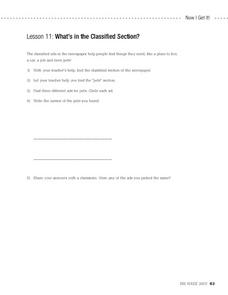Casimir Middle School
Biological Classification Worksheet
Classify living things with a set of worksheets that has pupils sorting and indentifying living and non-living things. Learners use the worksheets as a basis for finding their answers.
Curated OER
Science – How Living Things are Grouped
In this classification of living things instructional activity, students respond to 7 short answer, 10 true or false, 4 multiple choice, and 4 graphic organizer questions regarding how living things are grouped.
Curated OER
Classifying Living Things Wordsearch
In this biology worksheet, students locate and identify various vocabulary terms related to classifying living things. There are 24 biology terms located in the word search.
Curated OER
Classifying Living Things
In this classification worksheet, students read a description of how all living things are related and describe a diagram showing how this taxonomy works. Students answer five questions related to their reading.
Curated OER
Interactions of Living Things
Is it a producer, carnivore, omnivore, scavenger, or decomposer? Different relationships among organisms are explored here. It is a simple, multiple choice assignment. Use it as a quick warm-up or quiz.
Curated OER
Classifying Critters
In this classifying critters worksheet, students read a 1 page article on classifying living organisms and then answer 10 true or false, short answer, multiple choice or fill in the blank questions.
Curated OER
Organizing Life
In this taxonomy worksheet, students learn about Linnaeus' system for classifying living things. Students complete 2 fill in the blank and 2 short answer questions based on what they read.
Cornell University
Insect IPM
Find out the characteristics that makes a bug an insect with a workbook designed to inform scholars about the crawly creatures that live around us. Scholars complete an ant-themed word search, answer questions using a solution key,...
University of Hawaiʻi
Taxonomy and Me!
Taxonomy is the study of organisms and how you phylum. Three biology activities are included, helping scholars understand four of the six kingdoms, specifically Protista, Plantae, Fungi, and Animalia. Scholars observe and classify...
Curated OER
What's in the Classified Section
In this language arts worksheet, students discover the classified section of the newspaper. Students use a newspaper to find 3 different ads for pets and answer 5 questions.
Curated OER
What Is Life?
In this life characteristics worksheet, students answer 16 questions about living things, Redi's experiment, basic needs, growth and development.
Curated OER
Classifying Life
In this classifying life worksheet, students review the 5 kingdoms of organisms by completing 10 matching and 7 fill in the blank questions.
Curated OER
Distinguishing Between Flowers
A branching key is a great way to classify different types of animals and plants! Fifth graders answer several yes/no answers about three different plants. They then create their own key to differentiate between an iris, a rose, and a...
Curated OER
Mini-Ponds
In this mini pond worksheet, students create a mini-pond ecosystem with soil, water, and plant life. Students let their ecosystem sit for a day and they observe a sample the next day. Students identify all the pond water microorganisms...
Curated OER
Characteristics of Plants
In this characteristics of plants activity, learners name two things that all plants have in common. Then they describe how the cell walls and cuticles help plants adapt to life on land. Students also explain the difference between...
Curated OER
Ocean Life Zones
In this ocean worksheet, students answer questions about ocean life, the plants and animals of the ocean and their classification, the major life zones of the ocean and questions about an animal of their choice that lives in the ocean.
Curated OER
Taxonomy and the World of Microorganisms and Viruses
In this taxonomy activity, students understand how organisms are classified using Linnaeus' system. Students classify organisms as either plant or animal. This activity has 24 fill in the blank and 6 matching questions.
Curated OER
Structure and Function of the Cell/Introduction to the Cell
So, this is not technically a worksheet, but rather a chapter of reading material, pictures, and diagrams introducing young biologists to the cell. Cell theory, diversity, size, and shape are described. The internal organization and...
National Institute of Open Schooling
Biomolecules
An informative lesson has learners read about, discuss, and study the classification, structure and importance of the following biomolecules: carbohydrates, proteins, lipids, nucleic acids, and enzymes.
Curated OER
Fungi - Review and Reinforce
Diagrams of possible fungi life cycles are printed on the worksheet for biology pupils to evaluate. Short-answer questions ask them to explain what a fungus is, how it obtains food, and what would happen if they ceased to exist. The...
Curated OER
The Origin of Life
In this origin of life worksheet, students write answers to five questions. They describe characteristics of the first life forms and how scientists believe oxygen accumulated in the Earth's atmosphere.
Curated OER
Chemistry: Section Review
Review the 5 branches of chemistry and related terms with this worksheet. The focus of these activities is on terms and definitions. Learners answer questions about the study of chemistry, reasons to study chemistry, and pure and applied...
Curated OER
Amphibians Internet Activity
In this amphibians worksheet, students click on the links in the questions about amphibians to find the answers to the questions and then come back and answer the questions. Students answer 10 questions total.
Curated OER
Classification of Organisms
In this classification instructional activity, students solve 3 classification riddles, complete 6 true and false questions, complete 4 sequences, and solve a riddle about the classification of an animal.























